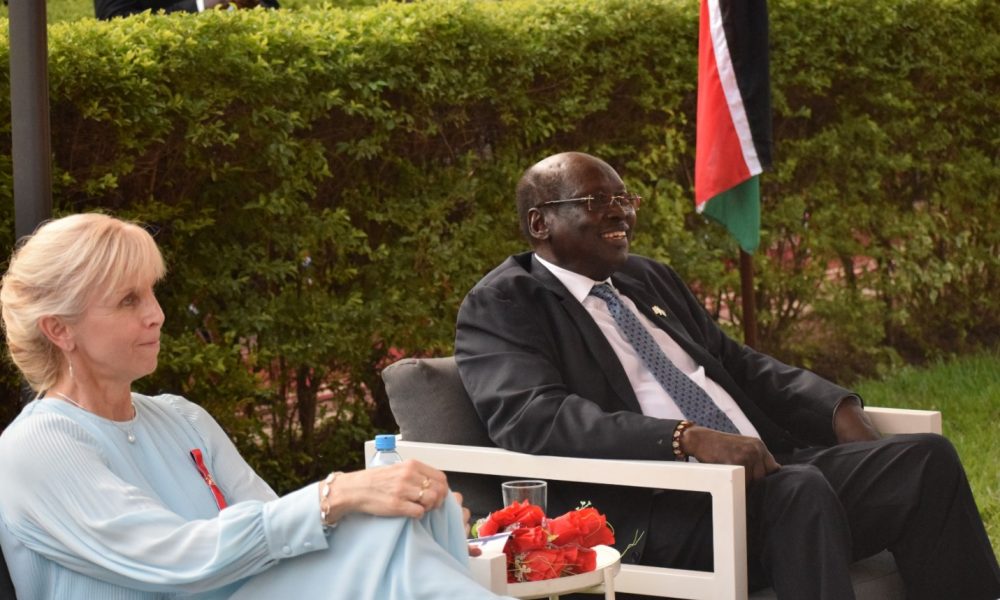By Ephraim Modi Duku Sokiri
On Wednesday, South Sudan government officials joined the Norwegian embassy in Juba in commemorating its 209th anniversary since their constitution was laid down.
The Constitution of the Kingdom of Norway was adopted on 16 May and signed on 17 May 1814 by the Norwegian Constituent Assembly at Eidsvoll. The latter date is the National Day of Norway; it marks the establishment of the constitution.
Norway’s flag was flown high in the sky, at the Norwegian Embassy; while guests waved at it as a gesture of respect to the constitution, freedom and values of the people of Norway.
The head of the Norwegian Embassy, Linken Nymann Berryman, while addressing the guests, said the day was to reflect back upon achieving such a momentous contemporary self-governing society.
“We take the opportunity to reflect upon this remarkable event that paved the way for a modern democratic society and marked a turning point in Norway’s journey towards independence and self-governance,” she said.
Until 1814, Norway was part of the Kingdom of Denmark. But following the defeat of Napoleon’s troops at the Battle of Leipzig in October 1813, the Treaty of Kiel of January 1814 ceded Norway to Sweden.
In response, the Crown Prince of Denmark, Norway and resident viceroy in Norway, Christian Frederik, started a Norwegian independence movement.
“It is a celebration for all people who value freedom and democracy. It is especially meaningful for me to be celebrating this day with all of you here in South Sudan, a country that has also struggled for its own independence,” she added.
Ambassador, Nymann disclosed having worked for 50 years with the people of South Sudan which has strengthened a special bond of friendship during difficult and good times.
She reflected on the prospect of a peaceful and law-abiding country, taking the values, priorities for liberty, as for the Norwegian people.
“Values of democracy, the rule of law, human rights and the freedom of speech must be looked after to be kept alive and well, we keep celebrating these values to uphold them as a priority for the future,” she stressed.
According to Nymann, the annual celebration in Norway serves to instill the young generations that such values should not be taken for granted, that they have fought and paid a high price for their freedom.
His Majesty, King Harald V, the Kingdom of Norway in a message to the Norwegian embassy in South Sudan and the people of South Sudan, expressed joy for his people in South Sudan, sending best wishes for the National Day and the future.
South Sudan Minister of Presidential Affairs, Barnaba Marial Benjamin, on behalf of the government reiterated the stand of the Norwegian Ambassador, that ‘never to take things for granted’ and yes in honor of the independence of the people of South Sudan.
For over a decade now, South Sudan struggles to write its own constitution, for over ten years, the country has been operating with an interim constitution, yet to vet her own.
The minister called on Norway for support, to ensure South Sudan has her own constitution.
“I can see why you ask me every time about our constitution, yours nearly 400 years ago, or even more and here we are still writing our own; we will welcome your support and your experience,” Marial alluded.
He added that the government of Norway has contributed intensely to supporting the peace processes of South Sudan during the long civil war, till date.
“Norway and South Sudan have a special bilateral relation dating back to the history of our struggle, history of the people of South Sudan which your country contributed a lot to see that the Addis Ababa peace agreement was signed and also the Comprehensive Peace Agreement in 2005,” Marial said.
The constitution is considered one of the world’s most liberal and democratic constitutions. It is the fourth oldest written single document national constitution in Europe after the Constitution of Poland, the French constitution of 1791, and the Spanish Constitution of 1812.
The document is also the second oldest working national constitution in the world, after the Constitution of the United States. In May 2014, the Storting passed the most substantial changes since 1814, particularly by including paragraphs on human rights.
The constitution shows a curious mix of radical and traditional values. The principle of separation of powers between the executive, legislative and judicial branches was directly inspired by radical ideas from the US and French systems.
The retention of a king, a constitutional church, defined as Evangelical-Lutheran, and the banning of Jesuits, monastic orders, and Jews, which latter were not allowed to travel to Norway, in the face of Republicanism was a traditionalist move; however, the king’s power was severely curtailed, and the church very much under the control of the elected body.
Suffrage was extended but was still restricted to certain groups of men. All men who were either farmers possessing their own land, civil servants, or urban property owners could vote. With this, about half of all Norwegian men were granted the right to vote.




